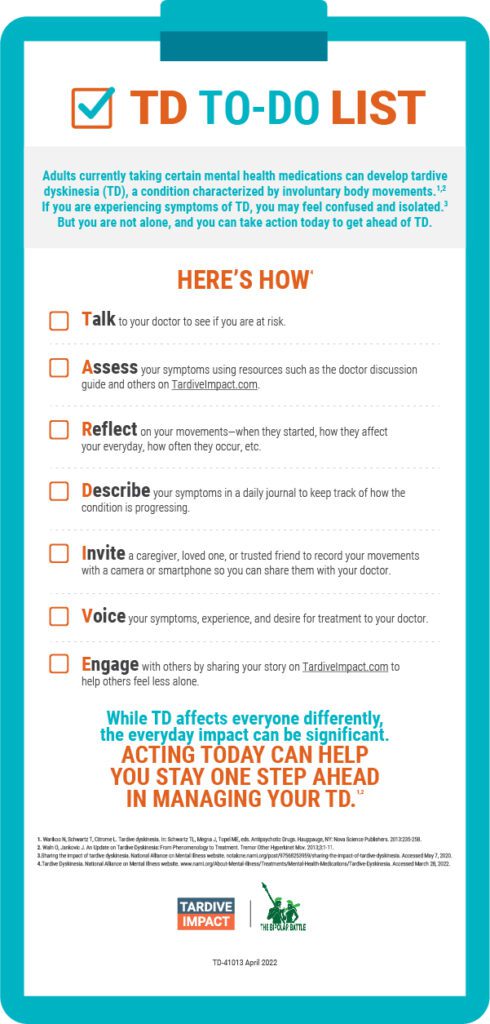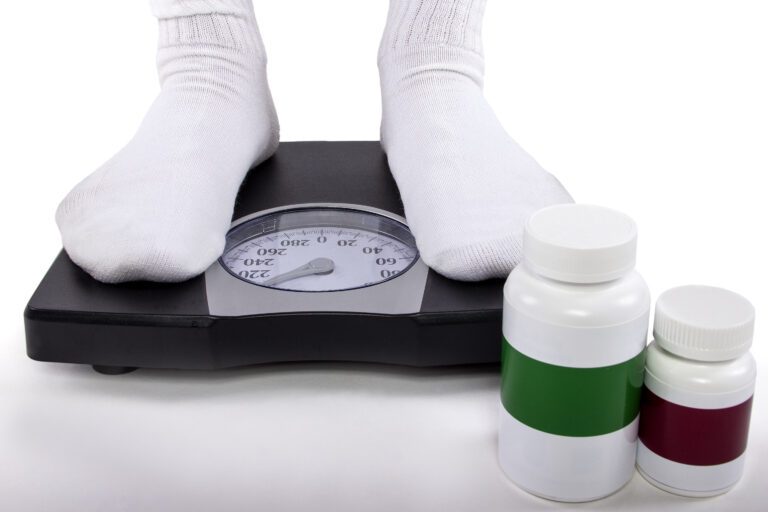My Experience With Tardive Dyskinesia
This content is created in partnership with Teva and is an important cause for me.
Tardive dyskinesia (TD) can be hard to diagnose.1 Symptoms might not appear until months or years after you start taking antipsychotic medication.2
If you are taking certain prescription medicines for mental health conditions and are experiencing uncontrollable movements in your hands, feet, face, or torso, you might have TD.2 I want to assure you that if you are experiencing TD symptoms, you are not alone. In fact, one in four people who are taking medications for conditions such as schizophrenia, bipolar disorder, and major depression may develop uncontrollable movements known as TD.1
In 1999, while I was in college at Colorado State University, I was diagnosed by a diligent on-campus psychiatrist with bipolar disorder type 1. She emphasized the importance of my taking an active role in my treatment, taking my medication as prescribed, and keeping an open line of communication with her regarding changes in my day-to-day ability to function.
A different doctor I saw years later noticed movement with my lips, during one appointment in particular. I had no control over those movements and it made me extremely self-conscious. I felt like everyone was judging me. Thankfully, the doctor led me through a number of motions, looking at my tongue, my motor coordination, and gait, and these uncontrollable movements were diagnosed as TD.2
With the doctor’s help, we developed an individualized plan that helped to address my TD symptoms, while continuing to manage my bipolar disorder.
Empowering Yourself Through Self-Advocacy
Since my original diagnosis, one of the biggest lessons I have learned is the importance of advocating for myself.
Each day, I make it a priority to write in my journal (or mood journal). Here’s what I typically write about:
- My mood.
- My anxiety.
- My physical well-being.
- Any indication of side effects from the medication I am taking (sometimes with a little help from a loved one).
- Anything specific that has triggered a significant feeling and/or reaction.
Then I relay this information to my healthcare provider at my follow-up appointments. It makes the little time I spend with them more efficient and effective.
My prescribing provider monitors my treatment. However, it is up to me to adhere to my treatment plan, as well as to take the necessary steps each day to manage my bipolar disorder. This is part of self-advocacy.
Actions Speak Louder Than Words
Discovering ways to manage my bipolar disorder has been a big part of my journey to better health. From my experience within the community, it seems that patients are seeking support from their friends, family, doctors, and therapists to help manage this condition, but COVID-19 has made this process much more difficult. In my opinion, providing alternative solutions to keep patients connected with their support groups is key in supporting overall patient well-being.2
For me, I do not want to just read about the symptoms of TD. Instead, I want actionable steps that will guide me on my journey to manage it. Below is a TD To-Do list with helpful advice on how you can be more active in tracking and identifying TD symptoms. Our loved ones can also be an important resource when going through the TD To Do List to help to identify and track possible symptoms of TD. Patients and caregivers can learn more about TD on TardiveImpact.com. You can also join the online community and share your TD journey.

When looking for a mental health provider to monitor your treatment, I suggest finding one you feel comfortable opening up to. I see the relationship I have with my provider as a collaboration. I also advise you to clarify their expectations of you so there is no confusion.
To learn more visit TardiveImpact.com
1 Waln O, Jankovic J. An Update on Tardive Dyskinesia: From Phenomenology to Treatment. Tremor Other Hyperkinet Mov. 2013;3:1-11
2 Tardive Dyskinesia. National Alliance on Mental Illness website. https://www.nami.org/About-Mental-Illness/Treatments/Mental-Health-Medications/Tardive-Dyskinesia. Accessed March 28, 2022.
TD-41023
May 2022





